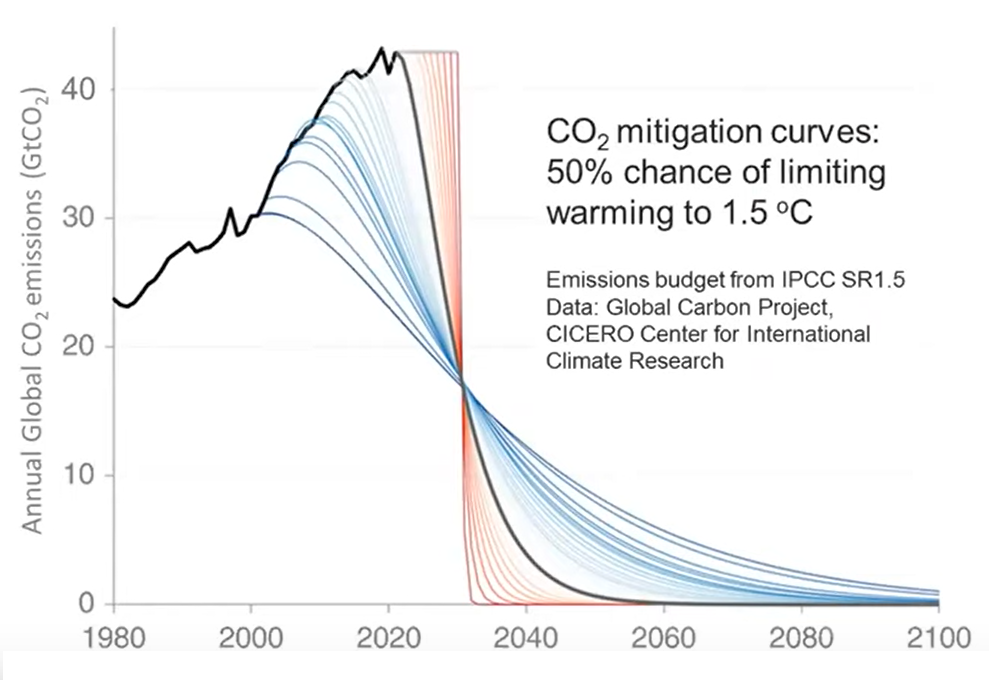
Action needed
There needs to be an honest discussion of the options, based on the science of climate change and the science of policy making, with the following steps.
Accept that serious errors have been made concerning climate change
Emission cuts could have been gradual, but the lack of action means they must now be radical
 Attribution: CICERO Center for International Climate Research
Attribution: CICERO Center for International Climate Research- international agreements were made to limit fossil fuel use, and were made for good reasons
- wealthy countries have avoided discussing that the implications of these agreements are radical changes in lifestyles
- cuts in emissions have consequently been inadequate
- children were promised a livable planet, as were people living in precarious climates, but adults in wealthy countries have continued reckless excessive use of energy.
If policy decisions made since the Paris Agreement (e.g. expansion of airports, campaigns against airport expansion and for taxing private jets) are compared with decisions that should have been taken (e.g. closure of most airports), it is clear that decision making has been fundamentally flawed. Decision makers, campaigners and wider society are acting as if they are unaware of the urgency of action, despite the wide availability of the scientific basis.
Facts and fairness dictate that it is emergency (not routine) action that is needed - and that the choices for the UK include a linear pathway to Net Zero 2029 for a limit of 1.5°C, or Net Zero 2034 for 1.6°C, requiring respectively 25% or 10% annual cuts in CO2 emissions.
- discuss the very rapid reduction of fossil fuel use, including
- a massive programme of insulation, ending leisure aviation within months, much reduced vehicle mileage, and restructuring of the food supply.
- a rapidly increasing carbon tax.
- take personal action
- disseminate accurate information
- challenge what is out of line with the science: inadequate government action, misinformation and poorly thought out policy proposals.
Start with some fundamental choices
Action on climate change requires reductions in fossil fuel use, which means an enormous number of decisions regarding the size and speed of reductions, for many aspects of life (food, travel etc), at many levels (personal, local, national etc), by many groups (national government, local government, businesses etc).This enormous number of decisions needs to be simplified by making some fundamental choices, as follows.
The basis for decision making
What kind of future do people want to build? Do they want one where the powerful take what they want, and will stop at nothing to get it - one based on greed and deceit (i.e. repeating the gross injusticies of slavery and colonialism) - or do they want a world based on facts and fairness.Subsequent comments are for those people who aspire to make policy decisions on the basis of facts and fairness (some might prefer the wording of "Truth and Justice"). Those who choose to do otherwise should, for transparency, state clearly their motivation and attempt to justify it.
The overall aim
Most countries are signatories to the Paris Agreement of 2015, which commits countries to limit global warming to well under 2°C (generally taken to be 1.7°C), and to pursue efforts to limit it to 1.5°C, with equity between nations. So compliance with the Paris Agreement means aiming for a limit to global warming of 1.5°C, 1.6°C or 1.7°C, with equity between nations.People who want to base climate action on facts and fairness need to comply with these Paris limits (and state which limit, where appropriate), or explicitly state that their action is not compliant with the Paris Agreement and attempt to justify why.
Subsequent comments apply to those who aspire to base climate action on facts and fairness, and on one of the Paris Agreement targets of 1.5°C, 1.6°C or 1.7°C, with equity between nations.
Emergency action or gradual decarbonisation
In order to comply with their Paris Agreement commitments, developed countries need to keep their total CO2 emissions within their fair share of the residual carbon budget for 1.5°C. For the UK, this runs out in 2027, and so emergency radical action is needed, not gradual decarbonisation. Other developed countries are similar.People who want to comply with their country's Paris Agreement commitments should advocate for emergency radical action to stop using fossil fuels, or explicitly state that their advocacy is not compliant with the Paris Agreement and attempt to justify why.
Subsequent comments apply to those who are advocating emergency radical climate action in order to be Paris compliant.
Assessing past progress against the action that was promised
Emission cuts could have been gradual, but the lack of action means they must now be radical
 Attribution: CICERO Center for International Climate Research
Attribution: CICERO Center for International Climate Research- international agreements were made to limit fossil fuel use, and were made for good reasons
- wealthy countries have avoided discussing that the implications of these agreements are radical changes in lifestyles
- cuts in emissions have consequently been inadequate
- children were promised a livable planet, as were people living in precarious climates, but in wealthy countries, the reckless excessive use of energy has continued.
It has to be concluded that progress towards the aim of an emergency end to fossil fuel use has been poor.
Who is responsible for the poor progress towards an emergency end to fossil fuels
Is it just one section of society that has prevented the use of fossil fuels being ended - e.g. politicians, or fossil fuel companies, or billionnaires?Examining the evidence shows that all sections of society have failed to face up to the size and speed of changes needed - and that includes the media, and climate campaigners.
Why are so many parts of society failing to discuss the need for emergency action to end fossil fuels
The science and maths are fairly simple, international agreements have been made, the need for an emergency end to fossil fuel use is clear, and declarations of Climate Emergency have been made. So why is there so little disccussion about ending fossil fuels. Is it a simple misunderstanding? It does not seem so, since (in the author's experience) well-meaning people are very resistant to being corrected. Instead it seems to be largely a form of psychological denial termed implicatory climate denial by climate psychologists, exacerbated by groupthink, overconfidence, and other cognitive biases, and by pseudoscience.Overcome the implicatory climate denial and other misthinking
The evidence is there is no technical barrier to stopping using fossil fuels - an important barrier is climate denial and other misthinking in well-meaning people. Things that appear to be obvious are not necessarily true. Despite appearances, the squares marked A and B in the optical illusion are
actually the same shade of grey!
 Attribution: Edward H. Adelson: Checker shadow illusion
Attribution: Edward H. Adelson: Checker shadow illusionIt is easy to draw wrong conclusions. Things that appear to be obvious are not necessarily true, (as in the optical illusion). The process of science has been developed to avoid wrong conclusions by reducing cognitive biases and denial e.g. by the use of placebo controls in drug trials to negate optimism bias. The same efforts to avoid bias need to be applied to policy making. This is not merely evidence-based policy making, since it is easy for decision makers to find some piece of evidence that fits with their preferred course of action and ignore the rest. Instead, there is a need to apply the full rigour of science to the policy making process - which could be termed science-based policy making.
This means:
- honesty
- transparency
- pooling of evidence, and agreeing a fair summary of it
- acceptance of fallibility - that decision making is often flawed due to numerous cognitive biases, and that measures are needed to overcome these biases, to scrutinise decisions and remove errors
- aiming for a consensus of reasonable people
- including external scrutiny of decisions
- shared decision making (SDM) to involve all parts of society
- resulting in a reasoned explanation of any decision, with enough detail included or referenced to ensure that any reasonable person would come to the same conclusion (reproducibility).
Face up to the difficult decisions on the speed of change
Facts and fairness dictate that it is emergency (not routine) action that is needed - and that the choices for the UK include a linear pathway to Net Zero 2029 for a limit of 1.5°C, or Net Zero 2034 for 1.6°C, requiring respectively 25% or 10% annual cuts in CO2 emissions. These options need to be discussed honestly.Rational collective action across society
- discuss the very rapid ending of use of fossil fuels, including
- a massive programme of insulation, ending leisure aviation within months, much reduced vehicle mileage, and restructuring of the food supply
- a rapidly increasing carbon tax
- a ban on advertising high carbon products and activities
- take personal action, reducing fossil fuel use as fast as possible
- disseminate accurate information
- explain that current affluent lifestyles are unsustainable, are at the expense of misery and premature death of some of the poorest people in the world, and will end one way or another, either through people organising radical change or through disorganised radical change being forced on us via the breakdown of societies
- explain the promises made in the Paris Agreement and the choices that the UK has to make
- anticipate shock and anger
- challenge what is out of line with the science:
- inadequate government action
- misinformation - whatever the source
- poorly thought out policy proposals
- advocates of climate action contradicting the IPCC and each other, e.g. Friends of the Earth's endorsement of the UK Government's Net Zero 2050 timescale.
Use a checklist to ensure conformity with the science and the Paris Agreement
This should include- the degree of urgency of action: emergency (not routine) action
- a limit to global warming e.g. 1.5°C or 1.6°C
- staying within the appropriate carbon budget
- equity between nations
- including all CO2 emissions
- double digit percentage annual emission cuts: a pathway to e.g. Net Zero 2030
- credibly compliant policies
- avoiding false solutions.
First published: 13 Feb 2025

 ✖
✖